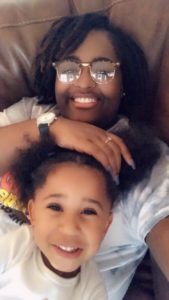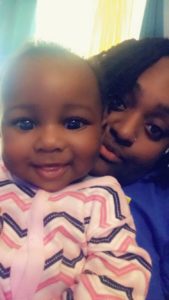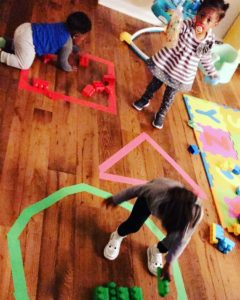We sat down with Amber, a preschool teacher who transitioned from working full-time at a school to providing in-home child care instead. She’s incredibly passionate about her work with kids and we enjoyed every second talking with her about her experience as a nanny.
 What She Does
What She Does
How did you become a nanny?
 I got the idea from a family in my preschool classroom. My background is primarily in early childhood education, but some of the families started to ask me to occasionally babysit for them. I then thought to myself, “well, if I could do this on just date-nights, let’s see if I could make a more consistent job out of it.” So I went from babysitting, to doing date nights, to doing more full-time work with families. It was a great way for me to still be in childcare, but not be in the classroom setting.
I got the idea from a family in my preschool classroom. My background is primarily in early childhood education, but some of the families started to ask me to occasionally babysit for them. I then thought to myself, “well, if I could do this on just date-nights, let’s see if I could make a more consistent job out of it.” So I went from babysitting, to doing date nights, to doing more full-time work with families. It was a great way for me to still be in childcare, but not be in the classroom setting.
How long did this transition from the classroom to nannying on your own take?
It took me about a year and a half. I was pretty hesitant at first because I didn’t want to leave a steady paying job to go out on a whim to nanny. I was going from a consistent 8-hour shift to a more unpredictable schedule. I was leaving job security to be my own boss—and you think it’s a good thing to be your own boss, but it was also kind of scary. I was at a preschool, and I was happy with it, but not fully happy. So it took me about a year and a half to fully leave the preschool to nannying full-time.
Why do you love being a nanny?
It gives me a break because I’ve been in childcare since I was 18. I’m 27 now, so this is pretty much all I’ve known. When I went off to college, I was already familiar with this field and wanted to utilize what I already knew and liked. I was overwhelmed by working in a classroom setting, but with nannying I get a lot more 1-on-1 time with the kids. Nannying allows me to still work in childcare, just with a little more freedom for me and still making an impact on children.
What type of care do you provide?
I have one family who I work with during ‘first shift,’ or during the day, two families I work with mid-day, and 2 over-nights. So they kind of cross-over and that’s how I’m able to do 5 families instead of just one.
How do you sleep?!
We have a strict bedtime here! I get home from my first job around 3pm. So from about 4-8pm if anyone asks me to care for their children while they do a quick errand, or have a meeting, I let them know that they have to be picked up by 8pm because the overnight kids need to go to bed.
What kind of responsibilities do you have?
 For the children who are in my home, (sometimes they’re coming from school or sometimes the parents have to go to work third shift) I help with homework, cook dinner, and help with other activities. To be with me from 6pm-6am is a long time. If the kids come at 6pm and don’t go to bed until 9pm, we have 3 hours together and I don’t want to just watch TV. The family who I work with in the morning has a 7-month old. We do fine-motor activities to help get her ready for when she goes to preschool or daycare. I do lessons and crafts with her as well. Since I have a background in early childhood education I try to utilize it and I will still do lessons even if they are infants.
For the children who are in my home, (sometimes they’re coming from school or sometimes the parents have to go to work third shift) I help with homework, cook dinner, and help with other activities. To be with me from 6pm-6am is a long time. If the kids come at 6pm and don’t go to bed until 9pm, we have 3 hours together and I don’t want to just watch TV. The family who I work with in the morning has a 7-month old. We do fine-motor activities to help get her ready for when she goes to preschool or daycare. I do lessons and crafts with her as well. Since I have a background in early childhood education I try to utilize it and I will still do lessons even if they are infants.
 Her Professional Approach
Her Professional Approach
What is your process of getting to know a new family?
I have a questionnaire that I have each family fill out. The questionnaire includes: what hours they will need, how many kids, and whether it will be in-home or drop-off care. Once we get passed the questionnaire, I will set up a time to meet the family and children at the location where the care will be provided and we determine whether this will be short or long term care. Once that is all settled, I have a contract that the parents and I both fill out.
How did you come up with the questionnaire and contract?
When I first decided to nanny with no other income involved, I knew I had to be as official as possible. I was leaving a really good job and needed to make sure all of my bases were covered, as well as the parents. The contract and questionnaire are so that both myself and the family would feel secure.
I don’t want to just be the person who came to your house and was there, I want to do activities and be involved. I want the kids to want me back.
What would you say is the most important thing for a healthy family/caregiver relationship?
Open communication. Without it, it wouldn’t work. I need to know what happened over the weekend, and the parents need to know what happened while I was with their children. I do daily sheets, reports, and send pictures throughout the day. For example, the child that I care for in the morning, I treat it as if she’s at daycare or school. There’s a daily sheet I use from the time I walk into the house until the time I leave. I type it up and then send it to the mom—anything from diaper changes, bottle feeding, activities we did, meals they ate (if they like it or not). I think communication is really, really important.
Why are the daily sheets important?
The preschool background in me comes out. The sheets consist of 30-minute intervals of the entire day. Even the infants I care for are provided with lesson plans. Things like reading, or music lessons provide more structure throughout the day. It’s also a great way to see how one activity can affect the child. For example, the family may notice that since we introduced one thing, the infant started sleeping more through the night. So it’s a way to give even an infant some daily structure. It’s also a way for the parent to see what happened throughout the day without me having to tell them, and the parent can always go back to the sheet to reference it.
Do you consider yourself to be a professional, why or why not?
Yes, I do. The more professional you are, the better. It’s how you keep clients coming to you. Since I work with infants a lot, they outgrow me. They go from needing me as a nanny to only needing me on date nights. If a parent has a good experience with me for 6 months, they will have no problem calling me for a weekend or occasional nights. I don’t want to just be the person who came to your house and was there, I want to do activities and be involved. I want the kids to want me back.
Her Experience
What’s something the kids in your care have taught you?
More patience. Typically I have a sweet spot for kids 2 years and younger—even when I was in the classroom setting. So when I took on the siblings (one is 4 years old and one is 6 years old), I thought well, this should be interesting. But I just love them so much now and they’ve taught me not to be afraid of this age. I never had done stuff like potty-training. Usually, I’m just changing diapers. So it’s definitely taught me to be more open-minded and have more patience.
Did you ever disagree with a parenting decision and why?
We may have differences of opinions. I do ask for style preferences in terms of feeding or parenting things. But through the years, I’ve always been open to how someone else does something. It is their child, so who I am to say? If it’s something crazy or out there, I can always say that I don’t think it would be a good match. If a family wants to try a new method or has a different way of doing something, I ask that they leave instructions and I’m always open to that.
I think that parents want the freedom and they want the help, but they’re not really sure how to go about finding it. Doing this has taught me how to be someone who is trustworthy.
What is the number #1 thing you’ve taken away as your experience as a nanny?
When I first started telling people what I do, and that I can care for children, it was almost like shell-shock. They were like “you do what?!” They didn’t really know what a nanny was. Some of the families had only seen it on TV and they were like “I’m not really sure what to say to do, or what to tell you.” And I would be like “I’m here to care for your kids so you can go study, or go to the movies, or dinner, and I’ll be here when you get back!” I think that parents want the freedom and they want the help, but they’re not really sure how to go about finding it. Doing this has taught me how to be someone who is trustworthy. I really believe that your reputation precedes you. Even from the families who knew me from caring for their children in preschool, it allowed them to know that they can trust me with their kids. I believe that your reputation should speak for you, before anyone has even spoken to you.
How do you make time for self-care?
I just had to learn it’s ok to say “I’m not working this weekend.” If I get last-minute calls I’ll look at the calendar and if I already marked down something for myself I’ll say no. If not, I’ll take the job. I’ve only just learned to be comfortable with saying ‘no.’ It takes time, but you just have to learn to be comfortable with it!
 What She Thinks
What She Thinks
What is the #1 misconception of being a nanny or sitter?
People thinking that you just sit there all day. I try to use my time wisely. Here’s the thing: when the child leaves me, they’ll be going into a school setting. I never want to be the cause of someone thinking the child didn’t do anything before entering school – or that their sitter didn’t do anything with them. Especially if I have the skills to get them where they need to be. There’s a misconception that sitters don’t really work because we’re just with kids all day, or with one child most of the day. That’s not what actually happens—I’m teaching or trying to get the child to accomplish something.
What is the most challenging thing about being a nanny?
Saying no. That’s how I ended up working so much. If a parent reaches out and needs care and I can’t help, I feel bad. Turning down clients or saying no has always been really hard for me. But sometimes I need a break too! Just finding a balance between my clients and my own time has been difficult. The other challenging thing is finalizing pricing—but finding balance is way harder!
I can only recommend it if you’re doing it for the love of children, the love for wanting to bond with families and to help them. You have to be in it for the right reasons.
Would you recommend being a nanny to others?
Yes, and no. It depends on the type of person that you are. I’m open to it because I like the freedom that comes with it, but it’s still a job. You shouldn’t come in thinking that you get to do nothing. You have to have a good work ethic and it probably needs to be even better since it’s just you and the child. I can only recommend it if you’re doing it for the love of children, the love for wanting to bond with families and to help them. You have to be in it for the right reasons.

What are your thoughts on traditional vs. non-traditional childcare?
I think it’s just important for families to know that nannies and babysitters are an option. A lot of my clients tell me that they’re not ready to send their children to preschool or daycare, but they still want to make sure their children reach their milestones while they have to go back to work. That’s a big selling point for me because I still want to get a child ready for school, but just not in the traditional sense (like in a school setting).
Lightning Round!
What is your favorite kid food/snack that you like to eat?
Goldfish
What is your favorite book to read with kids?
The Hungry Caterpillar and Corduroy books
What is your favorite movie to watch with kids?
The Incredibles 2
What is your current ‘kid-related thing’ you’re obsessed with?
I’m really big on arts and crafts. My favorite craft I call in transfer paper. For example, you smear paint on a leaf and then put it on a piece of paper and then the outline will remain on the paper.
What is a current kid-related thing you never want to see/hear again?
I think his name is Blippy on Kids YouTube. I didn’t even know what it was a month ago and now every kid is watching it.
What’s the most annoying thing a kid can do?
Not listening.
What is your favorite nickname a kid has given you?
Not being able to pronounce my name – I’m called ‘ember’ countless times.
What is the most interesting reason a parent has needed your care?
Most of the time it’s just ‘me-time,’ like hair or nail appointments.
What is your one wish for childcare?
That people are in child care because they actually love children. All of the news articles with people hurting children—I always ask why they couldn’t have just worked somewhere else, why did they have to come work with children and hurt them? I wish you could really find out the intentions of a person so that they won’t cause harm. I wish that could be resolved.

